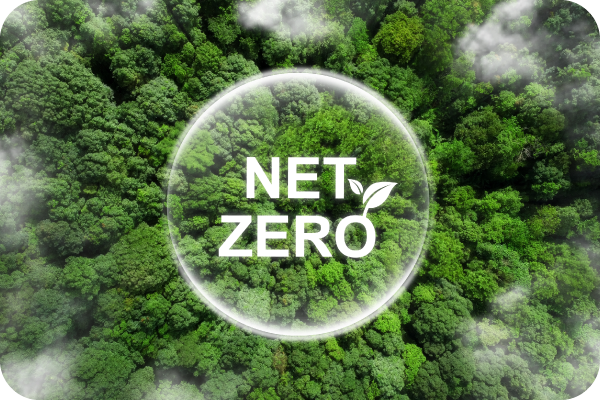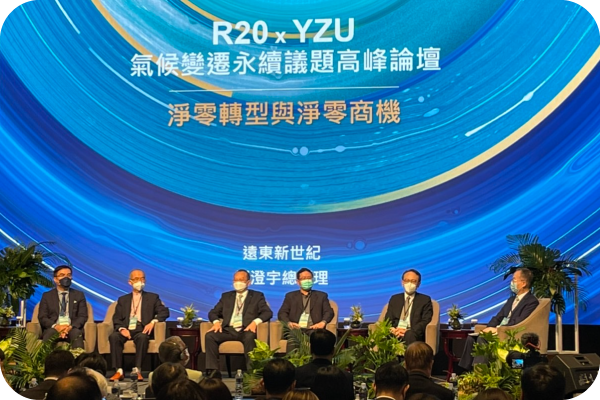Reaching Net Zero Through Low-carbon Transition
The impact from climate change and global warming is escalating. Extreme weather patterns continued to plague the world in 2022 as increasingly frequent natural disasters took their toll. Meanwhile, the war between Russia and Ukraine is adding fuel to the brewing energy crisis.
Information disclosed reflects data collected from the reporting year.
The impact from climate change and global warming is escalating. Extreme weather patterns continued to plague the world in 2022 as increasingly frequent natural disasters took their toll. Meanwhile, the war between Russia and Ukraine is adding fuel to the brewing energy crisis. To mitigate the effects of climate change and cap the global temperature rise under 1.5°C, over 130 countries have pledged to the net-zero vision. However, as the WEF indicates in the Global Risks Report 2022, the current efforts are not enough. “Climate action failure” has surpassed “extreme weather” as the most severe risk in the Global Risks Perception Survey. During COP27, more and more nations recognized the need to move away from fossil fuels and called for concrete actions. FENC has answered the call, taking climate actions towards the global carbon-reduction vision. With the seal of approval from the Board of Directors, the Company established the short-, mid- and long-term GHG reduction targets, pledging to reach net zero by 2050. The environmental and energy management mission at FENC is steered through the designated entity – the Energy Task Force, which leads and coordinates the energy and carbon reduction teams established at all FENC production sites. Through five major strategies, FENC is embarking on its carbon reduction pathway to build a green business model.
As the world’s focus on carbon issues intensifies, Taiwan enacted the Climate Change Response Act on February 15, 2023, laying out the 2050 net-zero vision with mandates on carbon taxes. On the international front, major brands are also rolling out requirements to achieve their carbon-reduction objectives. As the leader in the global polyester industry, FENC will strengthen its coalition with value chain partners, turning pressure into a driving force that will propel the world towards net zero.
Net-Zero Pathway
In 2022, the Board of Directors approved the short-, mid- and long-term GHG reduction targets for FENC. With 2020 as the baseline year, the Company is set to reduce 20% GHG emissions by 2025, 40% by 2030 and reach net zero by 2050.
Note: The emissions include categories 1 and 2 (scopes 1 and 2) emissions from all production sites within the scope of this report.
FIGP reached net zero in September 2022, becoming not only the first net-zero rPET plant in the industry, but in the entire world.
In 2022, FIGP reached net-zero emissions through the purchase of renewable energy certificates and carbon offset certificates. The plant will continue the practice to cover plant-wide electricity usage. The Kansai plant, which is currently under construction, is poised to become FENC’s second net-zero rPET plant by installing renewable energy equipment such as solar power panels and purchasing renewable energy certificates.
Building Low-Carbon Operation with Five Major Strategies
FENC takes pragmatic steps towards carbon reduction, establishing five major carbon-reduction strategies and building green operation through carbon-reduction pathways. In order to reach its 2030 GHG reduction targets, it is estimated that the Company will invest NT$19.4 billion and avert 1.32 million tCO2e in carbon emissions.
FENC's Path to Net Zero Through Low-Carbon Transformation (Chinese)
FENC established the inter-departmental Energy Task Force in 2010 to spearhead efforts in improving energy efficiency, which unfolded through the enhancement of production, equipment and energy management. In 2022, 67 energy and carbon reduction projects were implemented with the key focus being equipment enhancement to reduce electricity purchase. Five production sites in Taiwan and mainland China replaced and retrofitted the air compressor system in 2022, which delivers 13,290 MWh in energy saving and averts 6,700 tCO2e in carbon emissions each year. Future planning includes the installation of 35 MW of cogeneration system in Vietnam in 2026. While generating thermal energy, the system will also produce steam and electricity, which will improve fuel efficiency and reduce GHG emissions.
Since 2015, FENC production sites in Taiwan and mainland China have been replacing the high-emission water slurries and heavy oil boilers with the natural gas alternative, a lower-emission option. For the short-term, the Company will continue to expand the use of natural gas while evaluating the feasibility of biomass fuels. For the mid- and long-term, the Company plans to phase out of natural gas and into hydrogen fuel. In 2022, Hsinpu Chemical Fiber Plant replaced its heavy oil boilers with a hybrid system combining natural gas and light crude oil. Kuanyin Chemical Fiber Plant replaced four heavy oil boilers with natural gas models, reducing 34,800 tCO2e in carbon emissions annually. The dyeing and finishing plant of FEPV replaced 13% of coal fuel with wood pellets, reducing 10,282 tCO2e in carbon emissions. The polyester plant of FEPV started testing the mixture of wood pellets and coal in July. The plant has added up to 5% of sawdust pellets in the mixture, which helped reduce 1,111 tCO2e in carbon emissions in the second half of 2022.
Since FENC installed its first solar power generator in 2016, the Company has amassed the ability to generate 15,064kW of solar power at 13 FENC production sites in Taiwan, mainland China and Vietnam. In 2022, FENC generated 12,410 MWh of solar power for private consumption and purchased 97,900 MWh in renewable energy certificates, which helped the Company avert 64,266 tCO2e in carbon emissions. To further reduce its carbon footprint, FENC has invested considerably in a wide array of renewable energy alternatives and will continue to expand the solar, biomass and wind energy capacities in Taiwan, mainland China, Vietnam, Japan and the U.S. It is anticipated that by 2025, FENC will reach 90 MW in installed capacity for renewable energy, a 500% growth from 2022 that will be able to generate 100 GWh of renewable power. FENC will also purchase a minimum of 100 GWh of renewable energy annually beginning in 2023.
FENC wishes to reduce carbon emissions by capturing and reusing the boiler exhaust through the carbon capture, utilization and storage (CCUS) technology. Currently, the Company has established a new carbon reduction technology team to continue the research on relevant information and practices. The plan is to capture carbon directly through the emission device and convert the CO2 to chemicals such as methanol.
FENC adopts low-carbon fuel alternatives derived from biomass and other renewable sources. With its unrivaled core capability, the Company is developing and expanding the applications of more innovative materials that are low-carbon and environmentally friendly. Assessing from the span of the product life cycle, rPET resins made from post-consumer PET bottles cut GHG emissions by 63% compared to those of petroleum origin, which contributes to cutting scope 3 emissions from the industry value chain.
- Raw material recycling: As the leader in the global recycled polyester industry, FENC is reaching the vision of circular economy by looping waste back as raw materials.
- Biomass material: FENC aims to continue researching and developing biomass polyester materials that can be scaled and commercialized.
Note: Categories 1 and 2 (scopes 1 and 2) emissions.
Value Chain Engagement

The FSC in Taiwan issued the Sustainable Development Roadmap for TWSE- and TPEx-Listed Companies on March 3, 2022, requiring listed companies to disclose GHG inventory with third-party assurance within the required timeline. FENC acted immediately by taking stock of the current conditions and resources available at all subsidiaries and proceeding with the planning. In the first quarter of 2023, the GHG inventory of the parent company as well as the verification was completed. That is one year ahead of the required timeline. By the first quarter of 2025, the GHG inventory of all subsidiaries on FENC’s consolidated statement and the verification will be completed, which will be two years ahead of schedule, demonstrating FENC’s determination to support the government.

FENC is committed to corporate sustainability for the long haul. To stay on par with the best in the world and encourage fellow corporations to seek ways of mitigating effects of climate change, FENC signed the declaration to support the Task Force on Climate-Related Financial Disclosures (TCFD) on August 21, 2020. As of the end of December 2022, over 4,000 global corporations have signed the declaration. FENC is the first traditional manufacturing business in Taiwan to do so and its TCFD disclosures began in 2019 as part of the annual sustainability report. On March 2023, the Company issued its first TCFD Report. FENC also submitted the commitment letter to SBTi, pledging to be net-zero committed and reach its near-term target. The commitment letter has been accepted by SBTi, and the Company is submitting the reduction targets, joining global corporations on the march towards net zero.

FENC seeks close collaboration with international brands to build a low-carbon value chain by implementing a wide spectrum of energy and carbon reduction projects. The dyeing and finishing plant of FEPV partners with NIKE, pledging to complete multiple energy and water conservation projects by 2025. Each month, the plant submits energy consumption data and conservation progress on NIKE’s platform. Projects that had been completed during the reporting year include water conservation through reducing the liquor ratio of the dyeing machine and modifying the rising parameters; carbon and water reduction through increasing condensate recycling to 90%; replacement of coal fuel with biomass alternatives. Additional implementation by 2025 includes energy efficiency projects through ongoing equipment improvement; replacement of coal fuel with wood pellets; increasing renewable energy in the energy mix by installing 7.5MW of rooftop solar power generators.

On October 11, 2022, Yuan Ze University (YZU) invited R20 Regions of Climate Action to co-host the R20xYZU Climate Change Sustainability Summit in Taiwan to advocate sustainability and climate actions. Humphrey Cheng, President of Corporate Management, shared his insights during the forum with a talk on Net-Zero Transition and Opportunities. He talked about the beginning of FENC’s circular economy journey in 1988, and the Company’s tireless devotion to energy and carbon reduction. To join the global effort on environmental protection, FENC became the first to establish a PET bottle recycling plant in Taiwan. Its focus will continue to be the expansion and diversification of circular product applications, showing to the world its determination in steering towards low-carbon operation and net zero.








